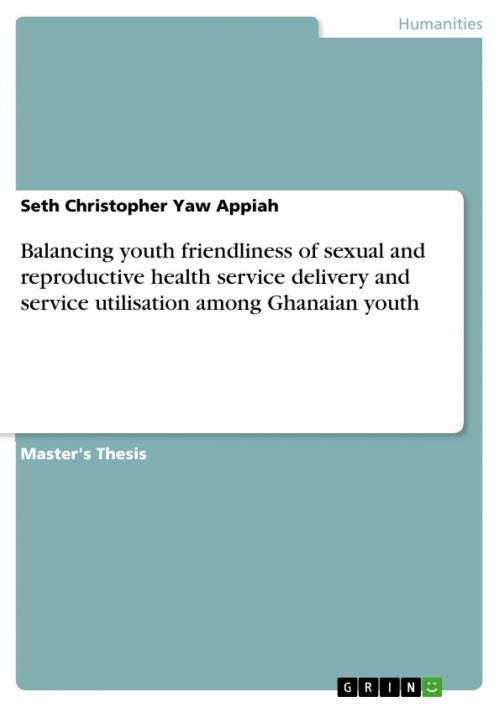Balancing youth friendliness of sexual and reproductive health service delivery and service utilisation among Ghanaian youth
Nonfiction, Social & Cultural Studies, Social Science, Sociology| Author: | Seth Christopher Yaw Appiah | ISBN: | 9783668041325 |
| Publisher: | GRIN Verlag | Publication: | September 7, 2015 |
| Imprint: | GRIN Verlag | Language: | English |
| Author: | Seth Christopher Yaw Appiah |
| ISBN: | 9783668041325 |
| Publisher: | GRIN Verlag |
| Publication: | September 7, 2015 |
| Imprint: | GRIN Verlag |
| Language: | English |
Master's Thesis from the year 2015 in the subject Sociology - Miscellaneous, grade: A (70.0), Kwame Nkrumah University of Science and Technology (DEPARTMENT OF SOCIOLOGY AND SOCIAL WORK), course: SOCIOLOGY, language: English, abstract: Incidence and prevalence of reproductive health difficulties have been shown to be higher among younger people in the society. Preferences for youth friendly sexual and reproductive health services and facilities are very limited. This study examines youth assessment of youth friendliness of sexual reproductive health services and how it influences their services reproductive health services utilization. The study adopted both descriptive and analytical cross sectional survey designs. In all 170 youth aged 10-24 were sampled from the Kwadaso Sub Metro using multi-stage stratified random sampling techniques. Both Bivariate and Univariate analysis were conducted with Chi-square test of significance and Pearson moment correlation to establish relations and associations between and among variables of interest. The study found out that in 56.0% (84/150) of the 150 in-school youth had ever had a boyfriend/girlfriend with the majority 39.3%(33/84) not recalling the length of stay with partner whiles only 58% (87/150) have heard about sexual reproductive health services offered in the study area. In all 45.2% (77/170) of youth (10-24) had had sexual experience in life time. Among the in -school youth with sexual experience were 63(thus 42% of total) whiles out of school youth was 14(70%). A total of 69.9% (44/63) in-school youth had sexual intercourse in the last six months whiles only 35.7(5/14) out of school youth had sex in the last six months A total of 55.8% (95/170) of all categories of youth had used at least one or more reproductive health service in lifetime. However, a marginal 25.2% (43/170) of youth had used facility based sexual reproductive health services out of which 39% and 44% considered the services very friendly and friendly. There was statistically significant relationship between youth knowledge of the available sexual reproductive health service and reproductive health service utilization (X2=0.00, P?0.05) and a strong positive correlation(r=0.5, R2=0.25). 25% of the relationship was explained by linear relationship. A stakeholder integrative and comprehensive approach is required scale up youth utilization of sexual reproductive health services especially facility based ones as friendliness is being improved upon and system barriers removed. This requires baseline survey of youth users of reproductive health services and the quality of services offered.
Master's Thesis from the year 2015 in the subject Sociology - Miscellaneous, grade: A (70.0), Kwame Nkrumah University of Science and Technology (DEPARTMENT OF SOCIOLOGY AND SOCIAL WORK), course: SOCIOLOGY, language: English, abstract: Incidence and prevalence of reproductive health difficulties have been shown to be higher among younger people in the society. Preferences for youth friendly sexual and reproductive health services and facilities are very limited. This study examines youth assessment of youth friendliness of sexual reproductive health services and how it influences their services reproductive health services utilization. The study adopted both descriptive and analytical cross sectional survey designs. In all 170 youth aged 10-24 were sampled from the Kwadaso Sub Metro using multi-stage stratified random sampling techniques. Both Bivariate and Univariate analysis were conducted with Chi-square test of significance and Pearson moment correlation to establish relations and associations between and among variables of interest. The study found out that in 56.0% (84/150) of the 150 in-school youth had ever had a boyfriend/girlfriend with the majority 39.3%(33/84) not recalling the length of stay with partner whiles only 58% (87/150) have heard about sexual reproductive health services offered in the study area. In all 45.2% (77/170) of youth (10-24) had had sexual experience in life time. Among the in -school youth with sexual experience were 63(thus 42% of total) whiles out of school youth was 14(70%). A total of 69.9% (44/63) in-school youth had sexual intercourse in the last six months whiles only 35.7(5/14) out of school youth had sex in the last six months A total of 55.8% (95/170) of all categories of youth had used at least one or more reproductive health service in lifetime. However, a marginal 25.2% (43/170) of youth had used facility based sexual reproductive health services out of which 39% and 44% considered the services very friendly and friendly. There was statistically significant relationship between youth knowledge of the available sexual reproductive health service and reproductive health service utilization (X2=0.00, P?0.05) and a strong positive correlation(r=0.5, R2=0.25). 25% of the relationship was explained by linear relationship. A stakeholder integrative and comprehensive approach is required scale up youth utilization of sexual reproductive health services especially facility based ones as friendliness is being improved upon and system barriers removed. This requires baseline survey of youth users of reproductive health services and the quality of services offered.















